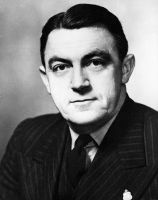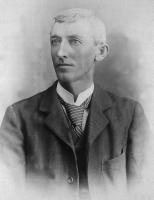
Sir Albert Arthur Dunstan, KCMG was an Australian politician who served as the 33rd premier of Victoria from 1935 to 1943 and from 1943 to 1945 and as the third deputy premier of Victoria for five days in March 1935. A member of the Country Party, now the National Party, his term as premier was the second-longest in the state's history and the longest of any third-party premier. He was the first person to hold the office of premier in its own right, and not an additional duty taken up by the Treasurer, Attorney-General or Chief Secretary.

In the Victorian political system, the State Minister for Housing is a State Government cabinet position responsible for Housing. The Minister for Housing is responsible for the Office of Housing ; and is one of six state ministers responsible for the Victorian Department of Families, Fairness and Housing (DFFH).

The Minister for Local Government in the Government of the Australian state of Victoria is the Minister responsible for supervising the activities of local government councils in the state, recommending allocation of grants to local governments for projects, assessing processes for redistributing municipal boundaries according to population, overseeing tendering processes for council services, airing any concerns of local governments at Cabinet meetings and co-ordinating council community and infrastructure work at a state level. The Minister achieves the Government's objectives through oversight of Local Government Victoria of the Department of Government Services.

The Treasurer of Victoria is the title held by the Cabinet Minister who is responsible for the financial management of the budget sector in the Australian state of Victoria. This primarily includes:

The Attorney-General of Victoria, in formal contexts also Attorney-General or Attorney General for Victoria, is a minister in the Government of Victoria, Australia. The Attorney-General is a senior minister in the state government and the First Law Officer of the State.
The First Dunstan Ministry was the 49th ministry of the Government of Victoria. It was led by the Premier of Victoria, Albert Dunstan. The ministry was sworn in on 2 April 1935, and was the first Country Party ministry in the history of Victoria.

The 1950 Victorian state election was held in the Australian state of Victoria on Saturday 13 May 1950 to elect 65 members of the state's Legislative Assembly.

The Postmaster-General of Victoria was a ministry portfolio within the Executive Council of Victoria. The position was created in 1857, shortly after the colony separated from New South Wales. Upon Federation, Section 51(v) of the Constitution of Australia gave the Commonwealth exclusive power for "postal, telegraphic, telephonic, and other like services" and the position in Victoria was abolished three months later on 1 March 1901.

The Victorian Minister for Transport Infrastructure is a minister within the Executive Council of Victoria. The minister's area of responsibility includes overseeing transport projects, major road projects, and the Victorian Department of Transport.

The Minister for Agriculture is a minister within the Executive Council of Victoria tasked with the responsibility of overseeing the Victorian Government's agriculture initiatives. The minister is supported by the Department of Energy, Environment and Climate Action's Agriculture Victoria.
The Third Peacock Ministry was the 42nd ministry of the Government of Victoria. It was led by the Premier of Victoria, Sir Alexander Peacock, and consisted of members of the Nationalist Party. The ministry was sworn in on 28 April 1924 following Peacock becoming leader of the Nationalist Party after the collapse of the Nationalist-Country Coalition government led by Harry Lawson. The ministry dissolved following the Nationalist Party's loss at the 1924 state election and was succeeded by George Prendergast's Labor government.

John Morrissey (1861-1926) was born in Thurles, Ireland and moved to Australia and became a teacher in Tatura during the 1870s. He later worked as a storekeeper and then a pastoralist until he joined the Victorian Legislative Assembly as the member for Rodney from 1 October 1897 to 1 May 1904 and then the member for Waranga from 1 June 1904 and 1 February 1907.

The Minister for the Environment is a minister within the Executive Council of Victoria tasked with the responsibility of overseeing the Victorian Government's laws and initiatives on environment.

The Minister for Education is a minister within the Executive Council of Victoria, Australia.
The Liberal Party, often known simply as the Liberals, was the name used by a number of political groupings and parties in the Victorian Parliament from the late 19th century until around 1917.

The Minister for the Conservation was a minister within the Executive Council of Victoria.

The Minister for Labour was a ministry portfolio within the Executive Council of Victoria. The portfolio was originally held by Alexander Peacock in the Second Turner ministry from 19 November 1900. At the dissolution of the Kirner ministry on 6 October 1992 the position was disestablished. The role was held by the Minister for Industrial Relations from 1999.

The Minister of Immigration was a ministry portfolio within the Executive Council of Victoria. It was later known as the Minister of Immigration and Ethnic Affairs.
The Second Peacock Ministry was the 39th ministry of the Government of Victoria. It was led by the premier of Victoria, Alexander Peacock, and consisted of members of the Commonwealth Liberal Party, later known as the Nationalist Party. The ministry was sworn in on 18 June 1914 following the resignation of Premier William Watt to contest the 1914 federal election. The government was defeated at the 1917 state election by the anti-Peacock faction of the Nationalist party and succeeded by the Bowser ministry.

The Commissioner of Trade and Customs was a ministerial portfolio in Colonial Victoria. The position replaced the collector of customs. Upon federation, the position was eventually abolished as the Commonwealth assumed responsibility for trade and customs under section 51(i) of the Constitution of Australia.
This page is based on this
Wikipedia article Text is available under the
CC BY-SA 4.0 license; additional terms may apply.
Images, videos and audio are available under their respective licenses.





